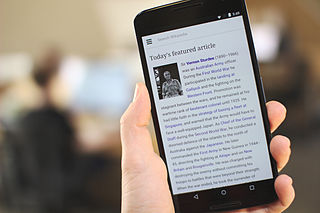The New York Times Best Seller list is widely considered the preeminent list of best-selling books in the United States. The New York Times Book Review has published the list weekly since October 12, 1931. In the 21st century, it has evolved into multiple lists, grouped by genre and format, including fiction and nonfiction, hardcover, paperback and electronic.

A smartphone, often simply called a phone, is a mobile device that combines the functionality of a traditional mobile phone with advanced computing capabilities. It typically has a touchscreen interface, allowing users to access a wide range of applications and services, such as web browsing, email, and social media, as well as multimedia playback and streaming. Smartphones have built-in cameras, GPS navigation, and support for various communication methods, including voice calls, text messaging, and internet-based messaging apps.

Mobile payment, also referred to as mobile money, mobile money transfer and mobile wallet, is any of various payment processing services operated under financial regulations and performed from or via a mobile device. Instead of paying with cash, cheque, or credit card, a consumer can use a payment app on a mobile device to pay for a wide range of services and digital or hard goods. Although the concept of using non-coin-based currency systems has a long history, it is only in the 21st century that the technology to support such systems has become widely available.

Near-field communication (NFC) is a set of communication protocols that enables communication between two electronic devices over a distance of 4 cm or less. NFC offers a low-speed connection through a simple setup that can be used for the bootstrapping of capable wireless connections. Like other proximity card technologies, NFC is based on inductive coupling between two electromagnetic coils present on a NFC-enabled device such as a smartphone. NFC communicating in one or both directions uses a frequency of 13.56 MHz in the globally available unlicensed radio frequency ISM band, compliant with the ISO/IEC 18000-3 air interface standard at data rates ranging from 106 to 848 kbit/s.

A display device is an output device for presentation of information in visual or tactile form. When the input information that is supplied has an electrical signal the display is called an electronic display.

A mobile device or handheld computer is a computer small enough to hold and operate in hand. Mobile devices are typically battery-powered and possess a flat-panel display and one or more built-in input devices, such as a touchscreen or keypad. Modern mobile devices often emphasize wireless networking, to both the Internet and to other devices in their vicinity, such as headsets or in-car entertainment systems, via Wi-Fi, Bluetooth, cellular networks, or near-field communication.

A QR code is a type of two-dimensional matrix barcode, invented in 1994, by Japanese company Denso Wave for labelling automobile parts. It features black squares on a white background with fiducial markers, readable by imaging devices like cameras, and processed using Reed–Solomon error correction until the image can be appropriately interpreted. The required data is then extracted from patterns that are present in both the horizontal and the vertical components of the QR image.
MicroStrategy Incorporated is an American development company that provides business intelligence (BI), mobile software, and cloud-based services. Founded in 1989 by Michael J. Saylor, Sanju Bansal, and Thomas Spahr, the firm develops software to analyze internal and external data in order to make business decisions and to develop mobile apps. It is a public company headquartered in Tysons Corner, Virginia, in the Washington metropolitan area. Its primary business analytics competitors include SAP AG Business Objects, IBM Cognos, and Oracle Corporation's BI Platform. Saylor is the Executive Chairman and, from 1989 to 2022, was the CEO.
Proximity marketing is the localized wireless distribution of advertising content associated with a particular place. Transmissions can be received by individuals in that location who wish to receive them and have the necessary equipment to do so.

Michael J. Saylor is an American entrepreneur and business executive. He is the executive chairman and co-founder of MicroStrategy, a company that provides business intelligence, mobile software, and cloud-based services. Saylor was MicroStrategy's chief executive officer from 1989 to 2022; in 2000, Saylor was charged by the SEC with fraudulently reporting MicroStrategy's financial results for the preceding two years. He later reached a settlement with the SEC for $350,000 in penalties and $8.3 million in personal disgorgement. Saylor is a bitcoin advocate and under Saylor MicroStrategy has spent billions of dollars to purchase over a hundred-thousand bitcoin. In 2024, he paid a $40 million fine to settle a tax fraud suit. He authored the 2012 book The Mobile Wave: How Mobile Intelligence Will Change Everything. He is also the sole trustee of Saylor Academy, a provider of free online education.
A digital wallet, also known as an e-wallet or mobile wallet, is an electronic device, online service, or software program that allows one party to make electronic transactions with another party bartering digital currency units for goods and services. This can include purchasing items either online or at the point of sale in a brick and mortar store, using either mobile payment or using a laptop or other personal computer. Money can be deposited in the digital wallet prior to any transactions or, in other cases, an individual's bank account can be linked to the digital wallet. Users might also have their driver's license, health card, loyalty card(s) and other ID documents stored within the wallet. The credentials can be passed to a merchant's terminal wirelessly via near field communication (NFC).

Contactless payment systems are credit cards and debit cards, key fobs, smart cards, or other devices, including smartphones and other mobile devices, that use radio-frequency identification (RFID) or near-field communication (NFC) for making secure payments. The embedded integrated circuit chip and antenna enable consumers to wave their card, fob, or handheld device over a reader at the point-of-sale terminal. Contactless payments are made in close physical proximity, unlike other types of mobile payments which use broad-area cellular or Wi-Fi networks and do not involve close physical proximity.
Mobile ticketing is the process whereby customers order, pay for, obtain, and validate tickets using mobile phones. A mobile ticket contains a verification unique to the holder's phone. Mobile tickets reduce the production and distribution costs associated with paper-based ticketing for operators by transferring the burden to the customer, who is required to contribute the cost of the physical device (smartphone) and internet access to the process. As a result of these prerequisites, and in contrast to paper-based systems, mobile ticketing does not follow the principles of universal design.
JVL Ventures, LLC d/b/a Softcard, was a joint venture between AT&T, T-Mobile and Verizon which produced a mobile payments platform known as Softcard, which used near-field communication (NFC) technology to allow users to pay for items at stores and restaurants with credit and debit card credentials stored on their smartphones. The partnership was first announced on November 16, 2010; following a trial period in 2012, the service officially launched nationwide on November 14, 2013. The official Softcard app was available for NFC-compatible smartphones using the Android operating system and later on Windows Phone 8.1.

Susan Horowitz Cain is an American writer and lecturer.
Sanju K. Bansal is an Indian-American businessman, the co-founder of MicroStrategy, a worldwide provider of enterprise software platforms for business intelligence (BI), mobile software, big data and cloud-based services. He served as the company's vice chairman of the board of directors and executive vice president till November 14, 2013. From 1993-2012, he served as chief operating officer of MicroStrategy. Bansal serves or has served as a member of the board of directors of CSRA, a technology services provider to the US government, Cvent, a cloud-based event management software provider, and The Advisory Board Company, a technology research services company.

Time to Get Tough: Making America #1 Again is a non-fiction book by Donald Trump. It was published in hardcover format by Regnery Publishing in 2011, and reissued under the title Time to Get Tough: Make America Great Again! in 2015 to match Trump's 2016 election campaign slogan. Trump had previously published The America We Deserve (2000) as preparation for his attempt to run in the 2000 U.S. presidential campaign with a populist platform. Time to Get Tough in contrast served as his prelude to the 2012 U.S. presidential campaign, with a conservative platform.

Climate of Hope: How Cities, Businesses, and Citizens can Save the Planet is an environmental science book by Carl Pope and Michael Bloomberg.
A QR code payment is a mobile payment method where payment is performed by scanning a QR code from a mobile app. This is an alternative to doing electronic funds transfer at point of sale using a payment terminal. This avoids a lot of the infrastructure traditionally associated with electronic payments such as payment cards, payment networks, payment terminal and merchant accounts.

How to Avoid a Climate Disaster: The Solutions We Have and the Breakthroughs We Need is a 2021 book by Bill Gates. In it, Gates presents what he learned in over a decade of studying climate change and investing in innovations to address global warming and recommends technological strategies to tackle it.












